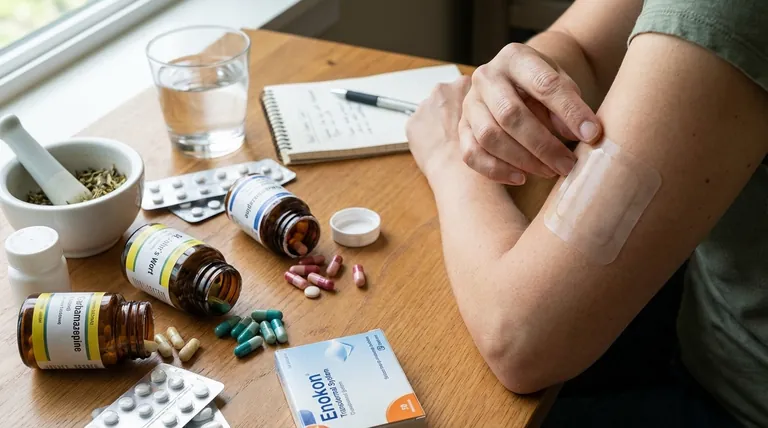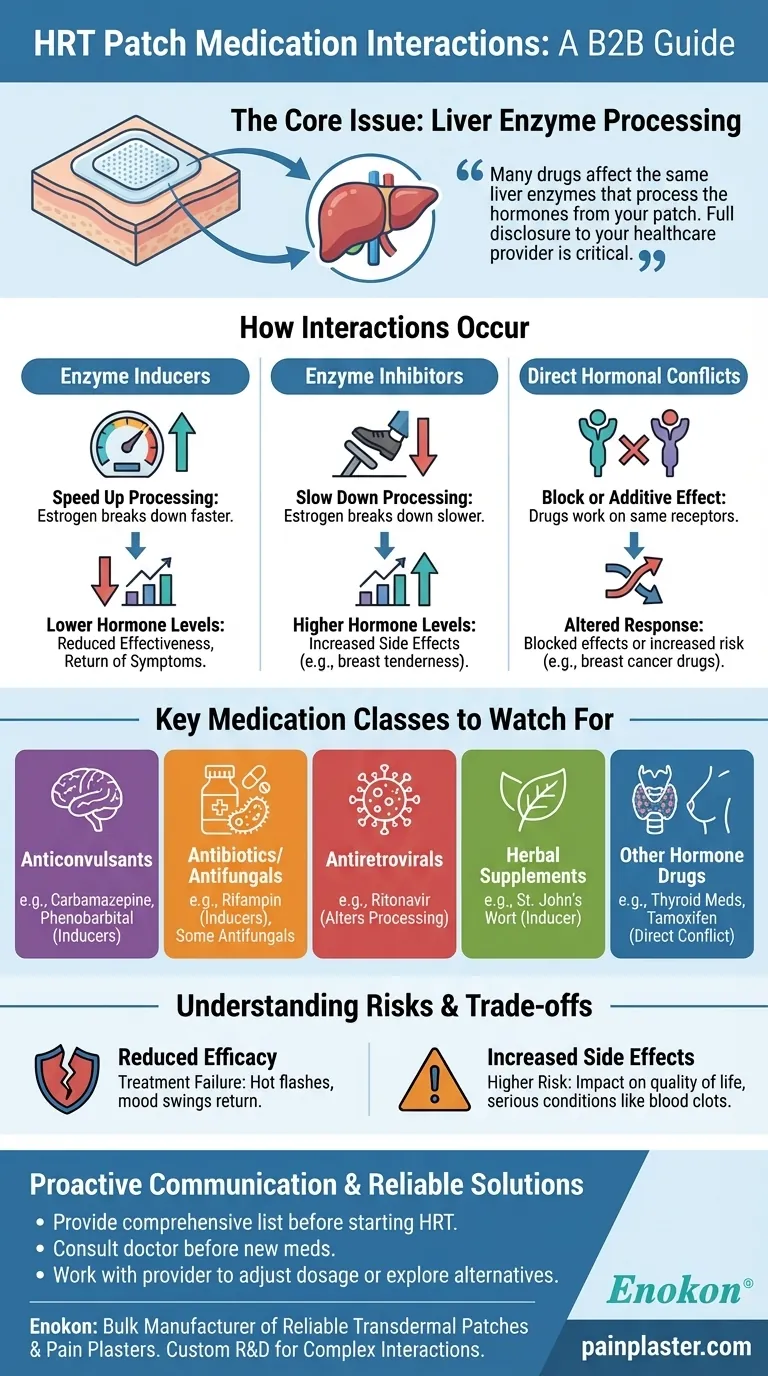To be direct, a range of medications and supplements can interact with Hormone Replacement Therapy (HRT) patches. The most significant categories include certain antiepileptics (like carbamazepine), some antibiotics and antifungals, specific antiretrovirals, thyroid medications, other hormone-based drugs, and the herbal supplement St. John's Wort.
The core issue is that many drugs affect the same liver enzymes that process the hormones from your patch. This can either reduce the effectiveness of your HRT or increase your risk of side effects, making full disclosure of all medications and supplements to your healthcare provider absolutely critical.

How Drug Interactions with HRT Patches Occur
Understanding an interaction isn't just about knowing the names of the drugs; it's about understanding how they interfere with your treatment. Most interactions happen in the liver, which acts as the body's primary processing center for medications and hormones.
The Impact of "Enzyme Inducers"
Some medications are known as enzyme inducers. They essentially speed up the liver's processing system.
This causes the estrogen from your HRT patch to be broken down and cleared from your body more quickly than intended. The result is lower hormone levels in your bloodstream, which can reduce the effectiveness of your treatment and lead to a return of symptoms.
The Impact of "Enzyme Inhibitors"
Conversely, some drugs are enzyme inhibitors. They slow down the liver's processing system.
This can cause estrogen to be broken down more slowly, leading to higher-than-intended concentrations in your body. This elevated level can increase the risk of hormone-related side effects, such as breast tenderness, nausea, or more serious health concerns.
Direct Hormonal Conflicts
A third type of interaction occurs when another medication works directly on the same hormone receptors as your HRT.
These drugs can either block the effects of your HRT or have an additive effect. This category includes other hormone therapies or drugs specifically designed to block estrogen, like those used in breast cancer treatment.
Key Medication Classes to Watch For
While you must discuss your complete medication list with a doctor, certain classes are well-known for their potential to interact with HRT patches.
Anticonvulsants (Antiepileptics)
Medications used to control seizures, such as carbamazepine and phenobarbital, are often potent enzyme inducers that can decrease HRT effectiveness.
Antibiotics and Antifungals
Certain powerful antibiotics like rifampin are strong enzyme inducers. Some antifungal medications can also interfere with hormone metabolism.
Antiretrovirals
Some medications used to treat HIV, such as ritonavir, can significantly alter the way the liver processes hormones.
Herbal Supplements
Never assume "natural" means safe. St. John's Wort is a well-documented enzyme inducer that can substantially lower the effectiveness of HRT.
Other Hormone-Related Medications
Drugs that directly influence the hormonal system can cause conflicts. This includes thyroid medications, selective estrogen receptor modulators (tamoxifen, raloxifene), and aromatase inhibitors.
Understanding the Risks and Trade-offs
Failing to account for drug interactions introduces two primary risks: treatment failure and increased side effects.
The Risk of Reduced Efficacy
The most common consequence of an interaction is that your HRT patch may stop working effectively. An enzyme-inducing drug can lower your hormone levels, causing symptoms like hot flashes, mood swings, or sleep disturbances to return.
The Risk of Increased Side Effects
If an interacting medication causes your hormone levels to become too high, you may experience more significant side effects. This not only impacts your quality of life but can also increase the risk of serious conditions like blood clots.
The Critical Need for Full Disclosure
The greatest risk is not communicating openly with your healthcare provider. You must provide a complete list of everything you take—prescription drugs, over-the-counter medicines, vitamins, and herbal supplements—before starting or stopping any new substance.
Making the Right Choice for Your Goal
Proactive communication is the key to managing your treatment safely. Your approach should be guided by your current situation.
- If your primary focus is starting HRT: Provide your doctor with a comprehensive list of every medication and supplement you take before you receive your first prescription.
- If your primary focus is managing current HRT: Consult your doctor or pharmacist before you start any new medication, including over-the-counter drugs or herbal remedies.
- If your primary focus is navigating a known interaction: Work with your doctor, as they may need to adjust your HRT dosage, change the interacting medication, or explore alternative treatments.
Ultimately, your safety depends on a collaborative partnership with your healthcare provider.
Summary Table:
| Medication/Supplement Class | Examples | Type of Interaction | Potential Effect on HRT |
|---|---|---|---|
| Anticonvulsants (Antiepileptics) | Carbamazepine, Phenobarbital | Enzyme Inducer | Reduces effectiveness |
| Antibiotics/Antifungals | Rifampin | Enzyme Inducer | Reduces effectiveness |
| Antiretrovirals | Ritonavir | Enzyme Inhibitor/Inducer | Alters hormone levels |
| Herbal Supplements | St. John's Wort | Enzyme Inducer | Reduces effectiveness |
| Other Hormone Therapies | Tamoxifen, Thyroid Medication | Direct Hormonal Conflict | Blocks or adds to effects |
Ensure Your Transdermal Patch Therapy is Safe and Effective
Navigating medication interactions is critical for patient safety and treatment success. As a bulk manufacturer of reliable transdermal patches and pain plasters, Enokon provides the technical expertise and custom R&D necessary to develop formulations that account for complex drug interactions.
If you are a healthcare or pharma distributor or brand looking for a trusted partner in transdermal delivery systems, contact our experts today to discuss how we can support your product development with safe, effective, and customized solutions.
Visual Guide

Related Products
- Far Infrared Heat Pain Relief Patches Transdermal Patches
- Heat Relief Capsicum Patch for Lower Back Pain Relief
- Heating Pain Relief Patches for Menstrual Cramps
- Far Infrared Knee Pain Patch Heat Patches for Pain Relief
- Far Infrared Deep Heat Relief Patches Medicated Pain Relief Patches
People Also Ask
- What are the key features of the Deep Heat Pain Relief Back Patch? Get Up to 16 Hours of Drug-Free Relief
- How does capsaicin work in the medicated heat patch? The Science Behind Pain Relief
- What are the common side effects of using the medicated heat patch? Understanding Risks & Safe Use
- How quickly does the Deep Heat Pain Relief Back Patch activate and how long does it provide warmth? Get 16-Hour Relief
- What types of pain can the Deep Heat Pain Relief Back Patch be used for? Targeted Relief for Muscles & Joints















